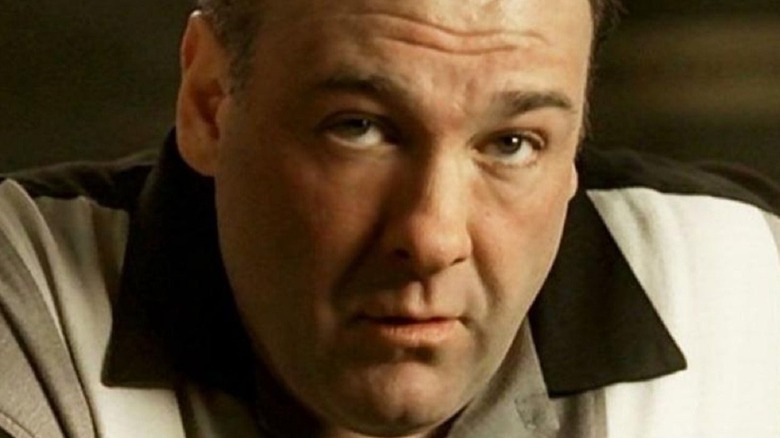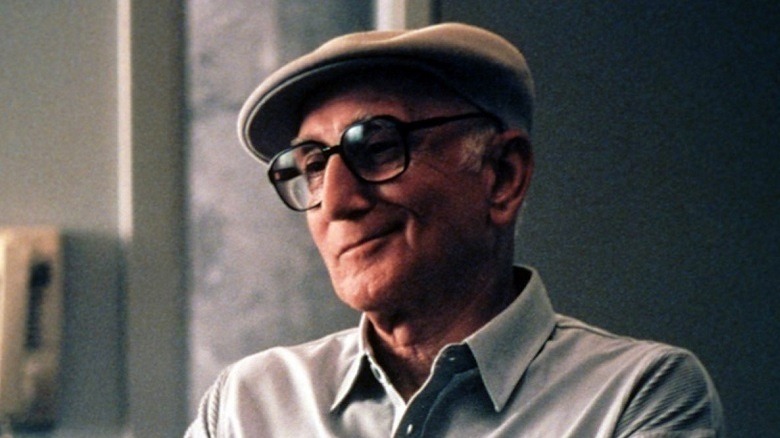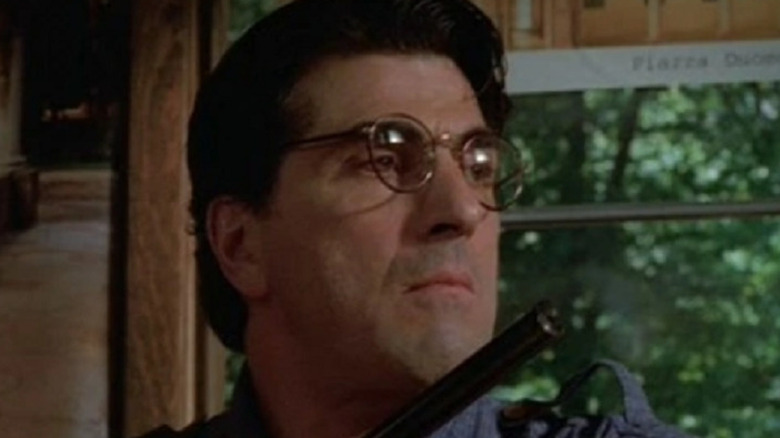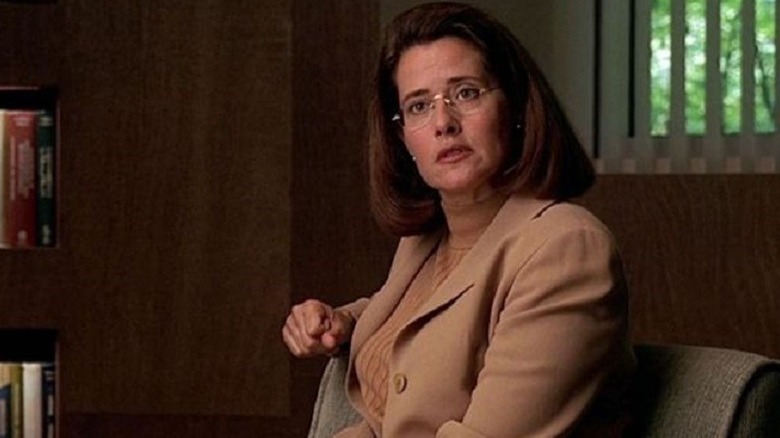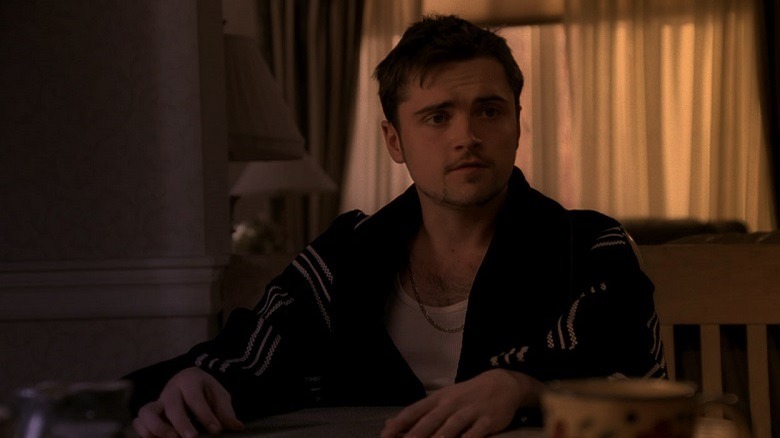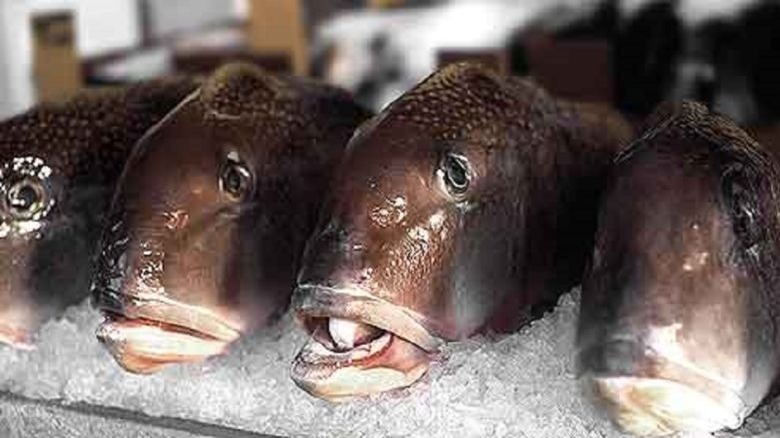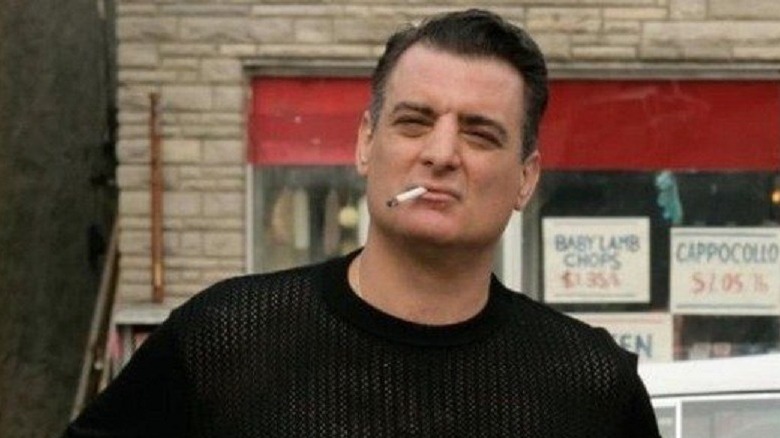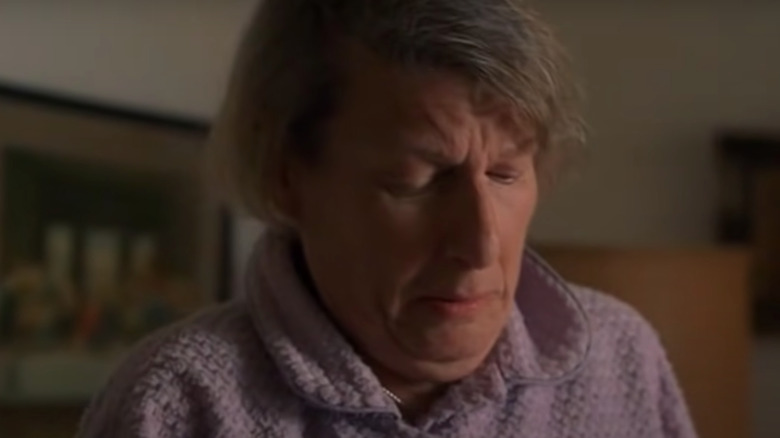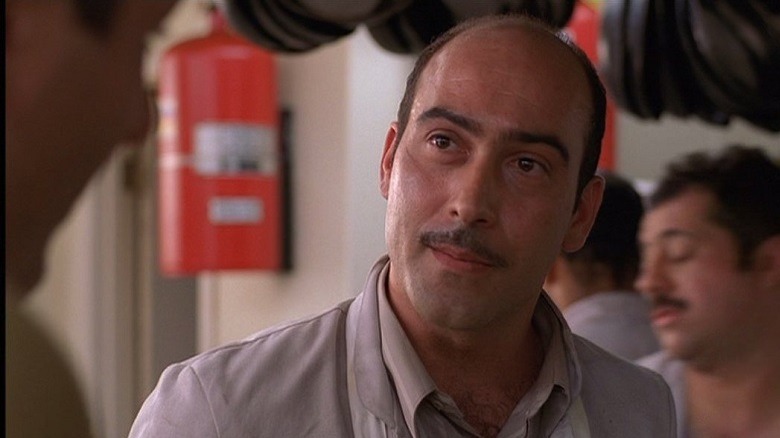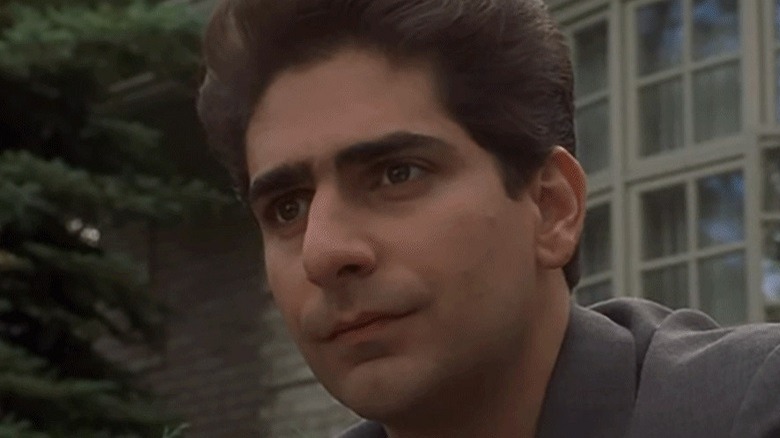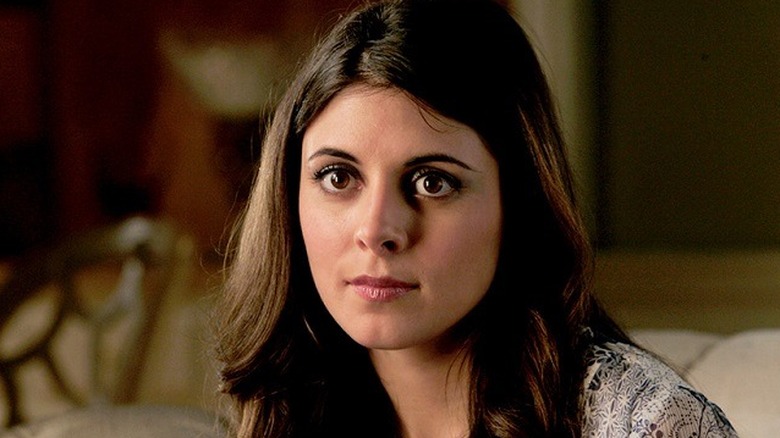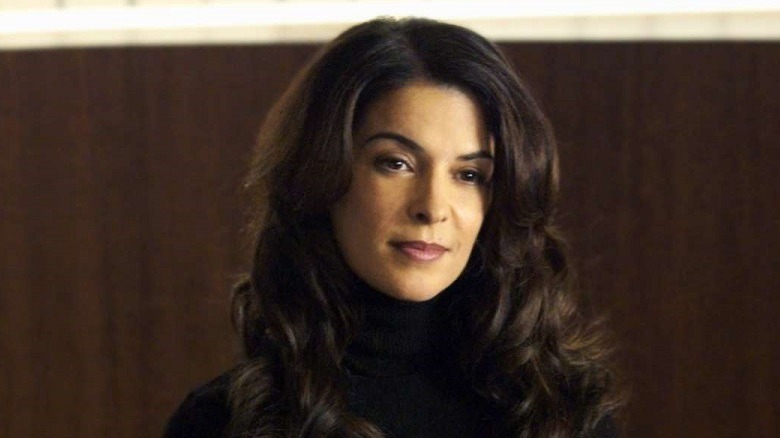The Untold Truth Of Tony Soprano
Anthony "Tony" Soprano, played by the legendary James Gandolfini (RIP), is the protagonist and legendary antihero of the HBO show "The Sopranos." As the leader of a Mafia family in suburban New Jersey, he has to deal with the daily problems of his "work" family as well as his real family at home.
The character paved the way for a slew of morally dubious TV protagonists like Walter White from "Breaking Bad," Vic Mackey from "The Shield," and Don Draper from "Mad Men." Tony is also a trailblazer in that the show explicitly discusses his mental health in a serious way — a rarity for TV generally and the gangster genre specifically. Indeed, it can be argued that the most important relationship Tony Soprano has is with his therapist, Dr. Melfi.
The prequel film "The Many Saints of Newark" features Tony Soprano as a teenager. What better way to prepare than to revisit one of the most complex, confounding, and charismatic television characters of all time? Let's take a look at some what-ifs for Tony, zero in on his therapy sessions and enigmatic dreams, and explore the real-life mobster who inspired the character.
The following article includes discussions of violence and self-harm.
The makings of a varsity athlete
When Tony's aging uncle Junior Soprano starts to mentally deteriorate, that doesn't stop him from needling his nephew. At a family dinner one night, Tony's son AJ discusses the difficulties he faces during his football season. Out of nowhere, Junior says to AJ, "Your father never had the makings of a varsity athlete." Tony is very sensitive about this, as he was an above-average high school athlete. He lettered in football and baseball, but only spent a single semester in college. A defensive Tony replies to Junior Soprano that some of the guys in college were "seven feet tall" and he took a break from school anyway. A derisive Junior replies that the real problem was that he had small hands.
Tony was actually good enough to nearly make All-County, but he never quite had the commitment to fully succeed. That's because he was already deep into the life of a young gangster, even in high school.
Tony later has a dream where he's talking to his old high school coach, Mr. Molinaro. His coach chastises him, telling him to "cleave yourself away from them bums you hang with." However, what Mr. Molinaro really sees in Tony is a potential coach: "You had smarts, personality, leadership potential. All the prerequisites to lead young men on to the field of sport." He also tells Tony that he always takes the easy way out, an idea that clearly weighed on Tony for the rest of his life.
The protagonist is not the hero
Tony Soprano is a charismatic figure: shrewd, personable, funny, confident, and dare we say sexy. That makes him extremely easy to like, in much the same way that gangster figures are often wish-fulfillment figures for their audiences. They make their own rules, everything they do has dramatic consequences, and there's a degree of glamor and glitz to their lifestyles. "The Sopranos" certainly goes to great lengths to downplay the romantic aspects of being a mobster. Even the opening credits show Tony's dull drive on the not-so-scenic New Jersey Turnpike to his comfortable suburban home. He's almost a normal, relatable schlub like the rest of us.
Tony's mental illness and his struggles with his families humanize him in the early going and make him easy to root for. That all changes in the fifth episode of the first season, "College." On a trip to look at prospective colleges with his daughter Meadow, Tony spots an old member of the Mafia who ratted them out and went into witness protection, Febby Petrulio. Tony tracks him down and brutally strangles him to death with a garrote. It is the first time the audience sees that switch flip to cold-blooded killer.
It isn't the last time, either, as his actions grow more extreme in upcoming seasons. Whether it is losing his temper and killing Ralph Cifaretto in a sloppy kitchen brawl or cruelly manipulating Adriana La Cerva into an execution after her betrayal, Tony proves himself to be a methodical and self-deluded monster.
A more efficient sociopath
The show starts with Tony seeking a cure for severe panic attacks that sometimes cause him to pass out. When a neurologist finds nothing, he refers him to a psychiatrist for medication and talk therapy. This is Dr. Jennifer Melfi (played by Lorraine Bracco), a sharp and empathetic practitioner who is not immune to Tony's blunt charm and gruff charisma. Their sessions are intense, with little to no camera movement, letting the tension (sexual and otherwise) between the characters steal the scene.
Throughout the series, Dr. Melfi challenges, comforts, confronts, and provokes Tony. She is often a sort of Greek chorus for him, giving him advice that (whether she realizes it or not) he uses in his mob dealings and forcing him to face facts, like his mother's personality disorder and attempts to have him killed. Melfi has her own problems, like alcoholism. She's also clearly drawn to Tony in a number of ways. The protection he could offer is particularly appealing to her after a brutal incident in "Employee of the Month." However, she never lets her professionalism slip far enough to cross the line with him, even though he comes onto her multiple times. She remains the one woman he can't have.
After being urged to drop him a number of times by her own therapist, she is given research that claims talk therapy does nothing to cure a sociopath. All she is doing is helping him become a more efficient criminal. This is borne out when she recommends he read books like Lao Tzu's "The Art of War" in order to solve "business" problems, which only helps him relieve some of his guilt due to his actions. She finally drops him as a client at the end of the series, infuriating Tony.
Rotten, putrid gene
There is a general stigma about getting mental health treatment, but if you're in the mob, that stigma is multiplied by a factor of about a rock. Tony sees his panic attacks as a sign of weakness. Going to a therapist (and realizing that the attacks were all in his head) is humiliating for him. When he learns that his father suffered from similar panic attacks, he assumes his own attacks are simply genetic, with no other causes. He recalls hearing about a relative from several generations back who "drove a mule cart off a mountain road" and wonders aloud if that was a panic attack, too.
Of course, Tony doesn't consider how panic attacks are a reaction to trauma. It's clear that there are generations of trauma in his own family that he carries as well. Instead of a loving household, he grew up with a distant mother who withheld affection and a violent father with a hair-trigger temper. It's no wonder that the depression that ran in the family manifested in panic attacks.
It's also no wonder that when he physically threatens his son AJ and hits him, AJ has a panic attack and faints, just like his dad and grandfather. What Tony describes as the "putrid...rotten Soprano gene" isn't really what he passed on to AJ; rather, it was generations of abuse passed on from father to son that magnified a genetic predisposition for depression and anxiety.
Dream life
Tony's vivid dreams are often a focus on "The Sopranos," as the show allows the audience to see Tony's innermost thoughts. Many of his early dreams are the usual sort of wish-fulfillment or anxiety dreams. For example, he dreams about having sex with Dr. Melfi. He sometimes dreams that important mob figures are in Dr. Melfi's office with him, and the secret he's trying to keep about getting therapy is revealed to all.
However, things get much weirder. At one point, he becomes so delusional and depressed that he imagines his neighbors have a young student named Isabella staying at their house while they were away. Surprisingly, Tony's relationship with her isn't sexual. As it turned out, she is a fantasy projection of the kind, loving mother he never had.
In "Funhouse," Tony has his first extended, truly weird dream. It flashes between violence (shooting his friend Paulie Walnuts), self-harm (lighting himself on fire so as to avoid an early death by murder), sex (a particularly filthy session with Dr. Melfi), and his deep subconscious fears. That is evidenced by going to a fish market and having one of the fish, voiced by his friend Sal "Big Pussy" Bonpensiero, tell him that he is an FBI informant. Tony knew it deep down, but didn't want to admit it. That dream winds up bearing directly on the plot.
In "Join the Club," he dreams that he was a salesman named Kevin Finnerty and tries desperately to get back to his own life. You might think the escape into normalcy would be welcome, but it turns out Tony feels stifled by the straight and narrow.
The inspirations
There are a lot of New Jersey mobsters said to have inspired the character of Tony Soprano. One of them, Ruggiero "Richie the Boot" Boiardo, was a Newark-based mob boss in the '60s and '70s. In "The Sopranos," Ercole DiMeo was the first boss of his crime family, operating extensively in the same era. Two of his top operatives were "Johnny Boy" and Junior Soprano. In real life, Boiardo's top man was nicknamed "Big Pussy" and he referred to his son Anthony as "Tony Boy." Boiardo lived in the New Jersey suburbs and had a huge house, much like Tony Soprano.
Another inspiration was Vincent "Vinny Ocean" Palermo. He came up through the ranks, not unlike Tony. There was even a real-life event that paralleled a storyline on "The Sopranos," where the acting head of the family was accused of being bisexual, and Palermo carried out a hit on him. After the hit, he essentially became the new acting boss, even though the old boss was still in prison. Palermo also had a close member of his crew betray him to the FBI. Unlike Tony Soprano, however, Palermo was forced to testify against his crime family and go into the witness protection program.
"The Sopranos" is convincing enough in its verisimilitude that real-life gangsters apparently wondered if the writers had somebody on the inside. James Gandolfini's convincingly grouchy performance—the man underslept and put rocks in his shoe to worsen his mood to match Tony's—only adds to it.
Family strife
In many ways, Tony's own blood relatives are far more treacherous than the men who work for him. Under the command of Jackie Aprile, there's stability in the DiMeo crime family, with Tony as a rising star who runs his own crew. Indeed, the crew includes some guys who were loyal to his father. When Jackie dies of cancer in Season 1, there's a power vacuum. It's obvious that Tony should run the show, but his uncle Junior is jealous, and they nearly go to war. Thanks to Dr. Melfi's advice, Tony allows Junior to think he's in charge while still pulling the strings behind the scenes. Junior also takes the heat publicly, allowing Tony some anonymity.
Later, when Tony's cruel mother Livia is outraged when he put her in a retirement home, she off-handedly suggests to Junior that Tony should be killed. Ever the master manipulator, Livia uses secret knowledge to inflict maximum pain on others. When Tony hears evidence from the FBI that this was true, he confronts her in the nursing home, only to find that she's had a stroke. Despite that, she taunts him by smiling as she's carted away. The hit on Tony fails, Tony kills Junior's two top guys, and Junior goes to prison. Years later, Junior fakes dementia but then develops real dementia, and shoots Tony in a confused state. Not exactly the most loving and supportive family.
With friends like these
Tony Soprano's best friends in high school are Davey Scatino and Artie Bucco. Neither is directly involved in organized crime, but by virtue of their friendship with Tony Soprano, organized crime becomes involved with them. Artie comes from a family of chefs and opened his own successful restaurant, Vesuvio. Tony and his crew eat there frequently. Artie secretly relishes having his restaurant be a mob favorite, soaking up a little of the glamor by proxy. He doesn't know that Tony burned down his restaurant to save him from the career-killing event of Uncle Junior's plans to carry out a hit there. Tony's mother, ever a meddler, later rats on him to Artie. Artie responds by confronting Tony with a rifle before backing down.
Davey Scatino owns a successful sporting goods store but has the bad luck of being a compulsive gambler. When he fails to pay Richie Aprile back in full, Aprile forbids Scatino from playing in any mob-run poker games. Scatino turns to Tony for help, at which point he learns that Tony hosts the high-stakes "Executive Game." Tony stakes Davey in, but warns him of the potential consequences. Sure enough, Davey goes down huge, owing Tony $45,000. Tony beats up his old friend when he tries to weasel out of his debt, and then later bankrupts him when he "bust-out" his store. A smirking and unusually literary Tony says it's like the parable of the Scorpion and the Frog: It was in his nature to sting.
Tony and Christopher
Christopher Moltisanti is technically Tony Soprano's cousin, but because of their age difference, Tony refers to him as his nephew. Christopher is a hothead with a smart mouth, but he's intensely loyal to Tony. In fact, part of Tony's long-term plan is to move Christopher up the ranks of his crew into a leadership position and distance himself yet again from his operation. Christopher was often trusted to clean up Tony's corpse-related messes, which takes a mental toll and likely contributes to his drug habit (more on that later).
Christopher seems to have it all: a career path, youth, good looks, and a beautiful fiancée in Adriana La Cerva. Sure, he's a little impatient and frequently flies off the handle, sure, but what mobster doesn't have anger issues? His real problem, though, is his heroin addiction, which makes him a liability for Tony. Tony helps Christopher get into rehab, and for a time, Christopher seems to be on the wagon again. Tony entices him to start drinking again in the mistaken belief that it is the lesser evil of two addictions, starting him down a dark path. When Adriana tells Christopher she's an informant for the FBI, Christopher is loyal enough to tell Tony, who has her killed. Christopher goes back to heroin, even as he finds a new woman to marry and have a kid with.
When he crashes a car he was driving with Tony in it, he begs Tony to take the fall because he'd fail a drug test. In one of the show's most shocking scenes, Tony's response to his irresponsibility is to asphyxiate him and cover it up.
A different path?
Tony often says that he doesn't want his children to get involved in his business and that he wanted to give them good lives and the best education. His daughter Meadow is an honor student and varsity soccer player who has ambitions of becoming a pediatrician. She's also quite aware that her father was involved in "the Mafia" and even confronts him about it on a trip to see colleges. He tells her some half-truths about making some money on illegal gambling, but won't give up anything else. She later realizes that her boyfriend, Jackie Aprile, Jr. was probably killed by someone in Tony's crew and angrily lashes out at the hypocrisy shown at Jackie's funeral. As she grows older, she switches her career track to law, in part because she believes the lies her father told her about being persecuted by the government because he was of Italian descent.
Anthony "AJ" Soprano, Jr. lacks his father's brain, grit, and sense of cruel ambition. Spoiled and privileged, he acts mostly out of boredom. He has moments where it seems like he's finding a purpose in life, but those are usually followed by debilitating bouts of depression that ultimately lead him to attempt suicide. He considers joining the Army, but Tony nixes the idea, instead getting him a new BMW and setting him up with a cushy job.
If you or anyone you know is having suicidal thoughts, please call the National Suicide Prevention Lifeline at 1-800-273-TALK (8255).
The many affairs of Tony Soprano
Mobsters refer to their extramarital girlfriends as their "goomah," and it's understood as victors taking their spoils. These women often seek the glamor and money available to them by associating with mobsters, but every woman who sleeps with Tony winds up worse off. The first such woman introduced in the show is Irina Peltsin, an unstable Russian for whom Tony feels genuine affection. Her erratic behavior (including calling the house) leads Tony to break up with her. He later goes on to sleep with her sister, which leads to even more confrontational behavior from Irina that, in turn, causes Carmella to leave Tony for a while.
He meets Gloria Trillo in Dr. Melfi's office, a fellow patient. Their relationship is so intense that Tony can't handle it, with Dr. Melfi referring to this as "amour fou"—crazy love. Gloria threatens to tell Carmella about them. Tony sends someone over to threaten her to stop, and she responds by killing herself.
Valentina La Paz is an art dealer who loves Tony's horse, Pie-O-My, as much as he did. Though they seem to have a healthy relationship, when her robe accidentally catches on fire and she's severely burned, Tony breaks up with her, revealing how shallow his interest is.
If you or anyone you know is having suicidal thoughts, please call the National Suicide Prevention Lifeline at 1-800-273-TALK (8255).
